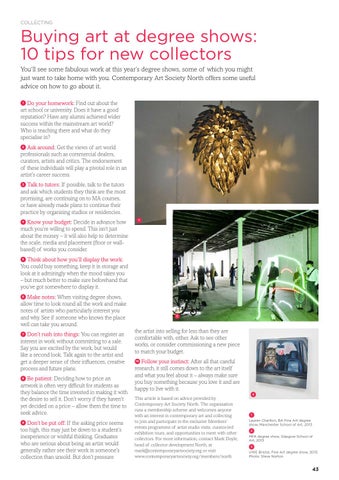COLLECTING
Buying art at degree shows: 10 tips for new collectors You’ll see some fabulous work at this year’s degree shows, some of which you might just want to take home with you. Contemporary Art Society North offers some useful advice on how to go about it. Do your homework: Find out about the art school or university. Does it have a good reputation? Have any alumni achieved wider success within the mainstream art world? Who is teaching there and what do they specialise in? 1
2 Ask around: Get the views of art world professionals such as commercial dealers, curators, artists and critics. The endorsement of these individuals will play a pivotal role in an artist’s career success. 3 Talk to tutors: If possible, talk to the tutors and ask which students they think are the most promising, are continuing on to MA courses, or have already made plans to continue their practice by organising studios or residencies.
Know your budget: Decide in advance how much you’re willing to spend. This isn’t just about the money – it will also help to determine the scale, media and placement (floor or wallbased) of works you consider. 4
1
5 Think about how you’ll display the work: You could buy something, keep it in storage and look at it admiringly when the mood takes you – but much better to make sure beforehand that you’ve got somewhere to display it.
Make notes: When visiting degree shows, allow time to look round all the work and make notes of artists who particularly interest you and why. See if someone who knows the place well can take you around. 6
Don’t rush into things: You can register an interest in work without committing to a sale. Say you are excited by the work, but would like a second look. Talk again to the artist and get a deeper sense of their influences, creative process and future plans. 7
Be patient: Deciding how to price an artwork is often very difficult for students as they balance the time invested in making it with the desire to sell it. Don’t worry if they haven’t yet decided on a price – allow them the time to seek advice. 8
Don’t be put off: If the asking price seems too high, this may just be down to a student’s inexperience or wishful thinking. Graduates who are serious about being an artist would generally rather see their work in someone’s collection than unsold. But don’t pressure 9
2
the artist into selling for less than they are comfortable with, either. Ask to see other works, or consider commissioning a new piece to match your budget. Follow your instinct: After all that careful research, it still comes down to the art itself and what you feel about it – always make sure you buy something because you love it and are happy to live with it. 10
This article is based on advice provided by Contemporary Art Society North. The organisation runs a membership scheme and welcomes anyone with an interest in contemporary art and collecting to join and participate in the exclusive Members’ events programme of artist studio visits, curator-led exhibition tours, and opportunities to meet with other collectors. For more information, contact Mark Doyle, head of collector development North, at mark@contemporaryartsociety.org or visit www.contemporaryartsociety.org/members/north
3
1
Lauren Charlton, BA Fine Art degree show, Manchester School of Art, 2013 2
MFA degree show, Glasgow School of Art, 2013 3
UWE Bristol, Fine Art degree show, 2013. Photo: Steve Norton
43
